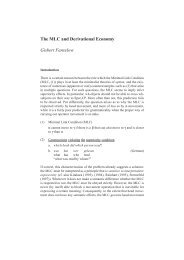Differential subject marking in Polish: The case of Genitive vs ...
Differential subject marking in Polish: The case of Genitive vs ...
Differential subject marking in Polish: The case of Genitive vs ...
You also want an ePaper? Increase the reach of your titles
YUMPU automatically turns print PDFs into web optimized ePapers that Google loves.
everyone and for those who accept it, it has a special <strong>in</strong>terpretation (i.e., the Partitive argument is<br />
<strong>in</strong>terpreted quantitatively <strong>in</strong> the sense <strong>of</strong> “part <strong>of</strong>” or “a little”, cf., e.g., Saloni and Swidz<strong>in</strong>ski<br />
1985:145-6, Swan 2002:333, or is “quantitatively <strong>in</strong>determ<strong>in</strong>ate”, cf. Rozwadowska and Willim<br />
2004:141). Such a partitive/quantificational <strong>in</strong>terpretation seems to be absent <strong>in</strong> the <strong>case</strong> <strong>of</strong> (3a).<br />
(11) a. On kupil chleb / chleba.<br />
he buy3.SG.M.PAST.PERF breadACC / breadGEN<br />
‘He (has) bought a/the loaf <strong>of</strong> bread/the bread. / ‘He (has) bought (some) bread.’<br />
b. On kupowal chleb /* chleba.<br />
he buy3.SG.M.PAST.IMPERF breadACC /* breadGEN<br />
‘He was buy<strong>in</strong>g bread/a/the loaf <strong>of</strong> bread/the bread.’<br />
To sum up the discussion so far, the GEN <strong>in</strong> negated existential-locative byc sentences seems to<br />
have what might be called “a hermaphroditic nature”. In other words, the GEN <strong>in</strong> such sentences<br />
appears to be a cross between the regular GoN <strong>in</strong> <strong>Polish</strong> and the optional Partitive <strong>mark<strong>in</strong>g</strong> <strong>of</strong> the<br />
<strong>in</strong>ternal argument. 19 Like the former it is triggered by negation (i.e., it is restricted to negated<br />
sentences) and like the latter it is affected by the aspectual properties <strong>of</strong> the predicate. However,<br />
unlike the regular GoN <strong>in</strong> <strong>Polish</strong>, the GEN <strong>mark<strong>in</strong>g</strong> <strong>in</strong> negated (existential)-locative byc<br />
sentences does not seem to obey the configurational condition on GoN assignment <strong>in</strong> <strong>Polish</strong>.<br />
Recall that the rule <strong>of</strong> GoN <strong>in</strong> <strong>Polish</strong> only applies to <strong>in</strong>ternal direct arguments <strong>of</strong> transitive verbs.<br />
Thus, it seems that for an <strong>in</strong>ternal argument to be GEN marked under negation <strong>in</strong> <strong>Polish</strong>, there<br />
must be another (external) argument present <strong>in</strong> the structure. 20 <strong>The</strong> similarity between the<br />
optional Partitive <strong>mark<strong>in</strong>g</strong>, as <strong>in</strong> (11), and GEN <strong>mark<strong>in</strong>g</strong> <strong>in</strong> negated (existential)-locative byc<br />
sentences, as <strong>in</strong> (3a), is also far from be<strong>in</strong>g perfect. It has been po<strong>in</strong>ted out that the Partitive<br />
marked arguments have a special quantificational <strong>in</strong>terpretation which seems to be miss<strong>in</strong>g <strong>in</strong> the<br />
<strong>case</strong> <strong>of</strong> the GEN marked argument <strong>in</strong> negated existential-locative byc sentences. What is,<br />
however, common to both <strong>case</strong>s is the fact that aspect seems to matter for the question <strong>of</strong> the <strong>case</strong><br />
<strong>mark<strong>in</strong>g</strong> <strong>of</strong> the nom<strong>in</strong>al argument. Given that the optional Partitive <strong>mark<strong>in</strong>g</strong>, as <strong>in</strong> (11), seems to<br />
‘He was dr<strong>in</strong>k<strong>in</strong>g/drunk (the) tea.’ ‘He drank the tea/some tea.’<br />
19 See also Witkos (1998:274-5, fn. 38) for some discussion on the nature <strong>of</strong> GEN <strong>in</strong> negated (existential)locative<br />
sentences <strong>in</strong> <strong>Polish</strong>. Unlike <strong>in</strong> the analysis proposed <strong>in</strong> this paper, Witkos does not make a connection<br />
between the GEN <strong>mark<strong>in</strong>g</strong> <strong>of</strong> the “<strong>subject</strong>” NP and the aspectual properties <strong>of</strong> the predicate <strong>in</strong> the <strong>case</strong>s under<br />
discussion.<br />
12

















